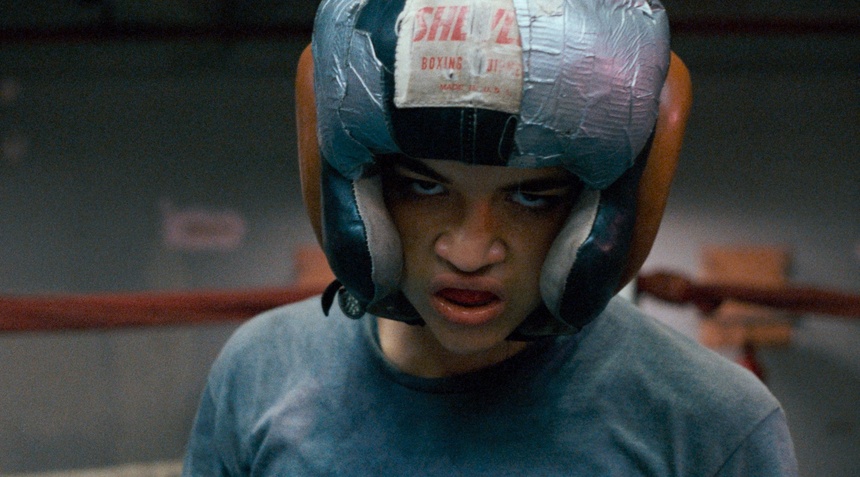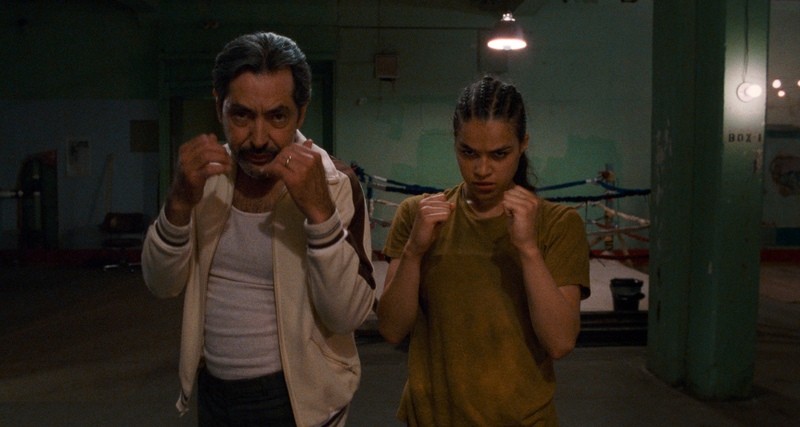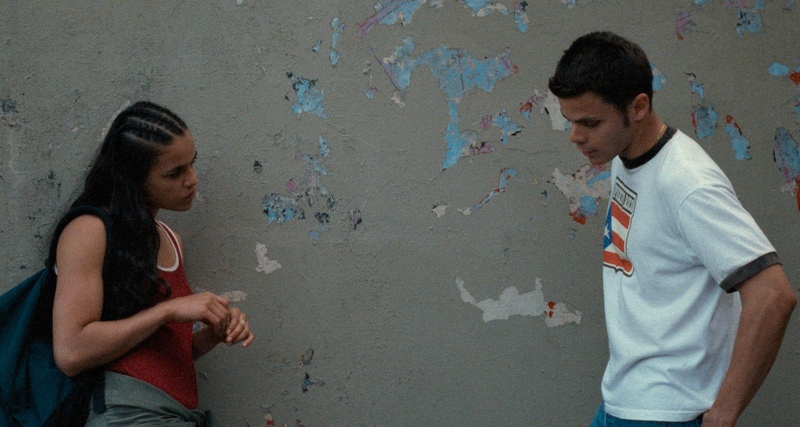GIRLFIGHT Blu-ray Review: Rage Harnessed and Powerful
Criterion Collection adds Karyn Kurama's Debut Feature

It's easy to get blasé about dramas that follow an individual as they learn a new sport/activity that becomes the centre of their world, giving their life deeper meaning; it's a common enough trope through cinema. But if you can get a filmmaker who finds a fresh take on that activity, and character, ti stands out. Such is the case with Girlfight, Karyn Kusama's 2000 feature debut. Winner of the Grand Jury and Directing Prizes at its release at Sundance Film Festival, it receives a fresh home release from Criterion.
Even more than two decades later, the story of Diana, a teen from a difficult home with some growing anger issues, who discovers a talewnt for boxing, remains surprisingly relevant. At that time, women engaging in any sport that involves hitting someone else, on a professional level, was laughed at. Even in today's world, an MMA fighter like Ronda Rousey constantly has to justify herself as a legitimate fighter.
Girlfight takes this to the ground level. Partially based on Kusama's own experience of training at a boxing gym while attending NYU, it has that quality that engages all the senses while watching: not just sight and sound, but feeling as each punch lands, tasting the blood in your mouth, smelling the sweat of the body. It's a raw heart exposed to the world, ready to battle.
When we first meet Diana (Michelle Rodriguez, in her debut performance), she's leaning against the lockers at her high school, just waiting for trouble to cause. She's got a lot of anger and she keeps taking it out on anyone she dislikes. Her mother committed suicide some years ago, and Diana still blames her father Sandro (Paul Calderon) for the abuse that led to it. Picking up her little brother from the boxing gym, Diana persuads trainer Hector (Jamie Tirelli) to take her on. As she develops her skills, she faces sexism, while also falling for fellow boxer Adrian (Santiago Douglas).
Head bent, forehead strong, eyes just looking up at your in challenge: Diana is as if a bull waiting to charge. Her only emotion might seem anger, but this is a girl who is unafraid to let her heart be shown. Part of her knows she's in danger of sliding into a troubled adulthood, but what else can she do when the system, and everyone around her, sees her as this untamable bull. But taming isn't what she needs, it's focus. Hector dismisses her desire to learn at first, but once he takes her on, he doesn't let her quit.
Kusama and her team blend the movement of the ring with the sound and music. As the movement is slow, so the music keeps a steady quick pace; as the movement is quick, so the music slows down. This contrast heightens each element and mixes them together keeping audience senses engaged. This is the push and pull of the body engaged in a fight for its survival and dominance, while the mind is fully humming as if in an odd kind of meditation - only this involves floating like a butterfly and stinging like a bee.
Rodriguez knocks it out of the park (literally and figuratively) in her performance. Her Diana is not trying to hide her emotions through boxing; her heart is stil on her sleeve, and her emotions guide her rather than being suppressed. In fact, her refusal to deny her feelings is what makes Diana grow more powerful. In finding boxing, she finds the perfect metaphor for herself. She never needed to change, she just needed to focus. She won't ever hide, and in the ring, that gives her strength.
A prime example of the new wave of American indie cinema of the early century, Girlfight is a gut-punching drama (yes, pun intended), showing how sometimes emotions must be let loose in order to thrive, that discipline doesn't have to mean supression, and following your heart, and you dream, is often worth the risk.
Criterion, as always, presents an amazing 4K restororation, supervised and approved by Kusama and her director of photography Patrick Cady. The colours jump off the screen, especially the reds and blues, as the colours of Diana's emotions. The surround sound brings the music and mix to life, to both see and hear every punch land. There's an audio commentary track by Kusama, as well as subititles for the dead and hard of hearing.
The interview with Kurama, directed by Alexandre O. Philippe, provides a nice overview of Kusama's career and inspirations. Like many, one of the first films she saw that made her want to be a filmmaker was Eraserhead, and she talks about how she learned to make films mostly by the DIY method. One of her obsessions, which is seen in how well she frames, is faces: she wants to see faces and how emotions spread across them, fill her frames. She discusses the romance of the above-ground subway likes, and her own experience learning to box while she was at NYU film school. There's also a short on the storyboards of two scenes, and how Karyn used those as templates - about having a plan that storyboards provide, but also how a filmmaker needs to be flexible. Composer Theodore Shapiro, and editor Plummy Tucker, discuss their work on the film, and especially how each of their work informed the other - how music and editing worked in tandem to enhance the story and support the underlying emotions that Kusama aimed to convey.
Carmen Maria Machado provides a terrific essay, 'Taking by Storm". She looks at how the character of Diana is changing her coming-of-age story, breaking with stereotypes of latinx female characters — she will not make her body, her personhood, her life into the way others want - she will do whatever it takes, to make it what she wants. The difficulties that Kusama faced in trying to get financing for a film directed by a woman, with a latinx lead - sadly not surprising. Machado discusses Kusama's continued legacy, and how much of her good work has found an audience, while some needed a second life (usually due to outside interference). The essay also gives a good overview on theories of boxing, and especially woman in boxing.
Girlfight
Director(s)
- Karyn Kusama
Writer(s)
- Karyn Kusama
Cast
- Michelle Rodriguez
- Douglas Santiago
- Jamie Tirelli









